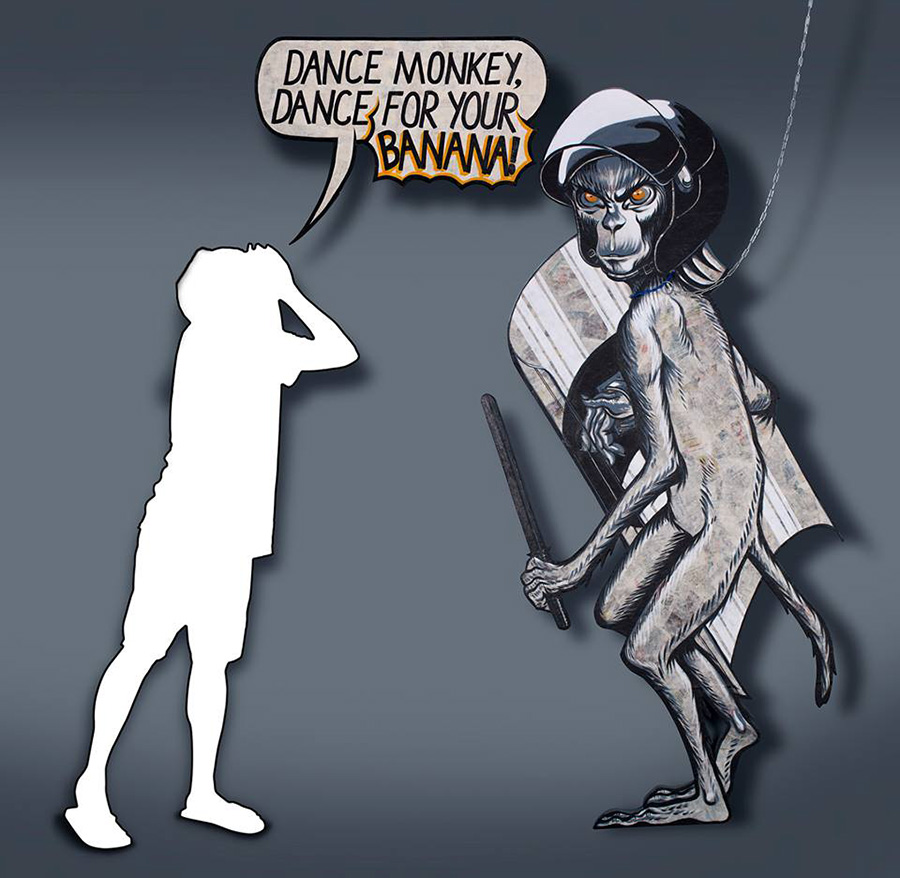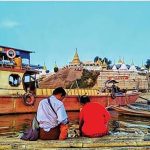The Irrawaddy Magazine |
- Commission of Enquiry for Rakhine to Report to President ‘Within a Year’
- 30 Years on, the Mission of Regime Change Remains a Work in Progress
- Momo Elephant Sculpture Awarded Guinness World Record
- Construction Ministry Keeps Richest School Projects for Itself: Report
- A Parliamentary Disagreement Over Terminology
- Civilian Lawmakers Counter Military Representatives’ Complaints Against Journalists
- Artists Reflect on Myanmar’s Political and Social Landscapes
- China-Linked Cyberattacks Likely as Malaysia Reviews Projects: Security Firm
- Dollar Off 13-Month Peak, Emerging Currencies Up on Sino-US Trade Talk News
| Commission of Enquiry for Rakhine to Report to President ‘Within a Year’ Posted: 16 Aug 2018 08:21 AM PDT CHIANG MAI, Thailand—The Independent Commission of Enquiry (ICoE) for Rakhine will commence its investigation into allegations of human rights violations and related issues following attacks on security posts in northern Rakhine State over the past two years and will report its findings to President U Win Myint within a year. The commission began work on Aug. 15, two weeks after its establishment. Its two international experts and two local members met with government ministers and State Counselor Daw Aung San Suu Kyi on Aug. 14 and held a press briefing in Naypyitaw on Thursday. Chaired by Philippine diplomat Rosario Malano, the ICoE finalized its terms of reference (TOR) this week, before launching its investigation into claims against Myanmar's security forces, beginning with allegations of human rights violations in Rakhine State. On July 30, the President's Office established the ICoE and tasked it with investigating "allegations of human rights violations and related issues, following the terrorist attacks" in October 2016 and August 2017 by the Arakan Rohingya Salvation Army (ARSA) in northern Rakhine State. Following the attacks, the government denounced ARSA as a terrorist organization. Subsequent military "clearance operations" led to the displacement of some 700,000 Rohingya Muslims or "Bengalis" into Bangladesh. The Commission said in its TOR it would be sure to cooperate with the respective ministries and on the government's provision of security for the commissioners. Ambassador Malano, a former deputy foreign minister of the Philippines, said the TOR ensured it would receive cooperation from the Myanmar government at the Union, state and regional levels and all relevant authorities in term of accessing information and securing testimony from military and police personnel. Malano said the ICoE would seek accountability and formulate recommendations on steps to ensure peace and stability in Rakhine State. In a response to The Irrawaddy's question on whether the Commission would meet high-level military and police personnel deemed critical to the allegations, she said it welcomed the participation of all, regardless of their rank. "Generally we can request [to meet] anybody who has knowledge of a case. We should cooperate, and we welcome cooperation and we will receive them and carry on the dialogue [necessary] to do the investigation," she told The Irrawaddy. She added that the commission will not "blame or finger-point" at anyone but seek "to cooperate" for peace in the region. Insisting that the commission would be independent, Ms. Malano added, "What I can assure you is we are going to be independent and impartial and neutral, because truth is the only way forward." The commission will "certainly" work to meet communities on both sides of the Rakhine State conflict "to be fair and to be as impartial as possible." Regarding Myanmar nationalists' opposition to the establishment of the commission, Ms. Malano said on Thursday that as a member country of ASEAN, the Philippines is ready to help "resolve the problems if we can be of help to [Myanmar]." She said member nations of ASEAN should uphold ASEAN's spirit and attitude to work together for peace, security, cooperation and prosperity for the whole region. "So any state in ASEAN, whether the Philippines or any of the member states, is very disposed to help a particular state; we will be there. I think this should be understood by those who objected to the creation of the commission," she added. As the Independent Commission of Enquiry begins its investigation, the previously formed Rakhine Advisory Board to the Committee for Implementation of the Recommendations on Rakhine State on Thursday submitted its final report to State Counselor Daw Aung San San Suu Kyi and the committee chairman, Dr. Win Myat Aye, the Union Minister for Social Welfare, Relief and Resettlement. The Rakhine Advisory Board was chaired by Dr. Surakiart Sathirathai and assisted "by acting as a bridge builder" between the Myanmar government and the international community. It praised the Implementation Committee for its ongoing efforts and progress in implementing the recommendations of the Advisory Commission led by former UN Secretary General Kofi Annan, but also highlighted in its statement on Aug. 16 that it "recognized that much work remains to be done, particularly in the area of repatriation and resettlement." Htet Naing Zaw contributed to this report from Naypyitaw. The post Commission of Enquiry for Rakhine to Report to President 'Within a Year' appeared first on The Irrawaddy. |
| 30 Years on, the Mission of Regime Change Remains a Work in Progress Posted: 16 Aug 2018 06:17 AM PDT When the people of Myanmar defied the socialist military regime's automatic rifles and took to the streets in 1988 to demand democracy, what they were really saying was: "We want regime change." Thirty years on, that regime (whether in the form of General Ne Win's authoritarian administration or the military governments that succeeded it) no longer exists in a technical sense. But in another sense it never really went away. Rather, it conducted a kind of tactical retreat, successfully executing an exit strategy that has allowed its institutions to maintain considerable power. That's not to say that this result doesn't represent at least a partial success for the ongoing pro-democracy movement, which is now three decades old. On Aug. 8 this year we saw some of Myanmar's major cities and towns commemorate the 30th anniversary of the nationwide "8888" pro-democracy uprising. As the remembrances wind down, the key question for many people, particularly seasoned political activists, is: "Did the popular uprising achieve the people's aims?" The shortening of the lifespan of the military government doesn't mean that the '88 uprising achieved its fundamental aim: to persuade the nation's powerful military to return, once and for all, to the barracks and withdraw fully and permanently from the political arena. As it unfolded, what did we hope would come out of the uprising in 1988? Most of us imagined that a democratic government would replace the socialist authoritarian regime controlled by Gen. Ne Win; that the military would return to its barracks and withdraw from the political arena; that an elected civilian government would transform the battered country into a prosperous democracy; that all ethnic people would enjoy autonomy and equality and that the civil wars in their states would end; that the country would catch up with Asia's tigers and enter a new golden economic era; and that Myanmar would be a country that, having recovered its political integrity and unique atmosphere, would be free to try and achieve its aspirations. Thirty years later, many — if not most — of those dreams still seem farfetched. While we do have an elected civilian government, it does not have a totally free hand. Myanmar today is in a state of confusion. What we have in Myanmar today is a political forced marriage between an elected civilian government and the powerful military. This political "wedding" was arranged in accordance with the 2008 Constitution, which was drafted by the previous military regime and reflects its desire to maintain a significant role in the political arena, granting it three key Cabinet posts, 25 percent of the seats in Parliament (held by unelected military-appointed lawmakers) and — as we all know — direct control of the local administrations around the country via the General Administration Department. Unsurprisingly, this political marriage has not been a happy one, and the couple's extended family — the people of Myanmar — do not approve of it. (Though all acknowledge that the current political situation is an improvement over the previous military regime.) The elected ruling National League for Democracy-led government, led by the country's de facto leader, State Counselor Daw Aung San Suu Kyi, and its supporters have been trying to amend the undemocratic Constitution since it took power in March 2016. The aim is to remove or reduce the role of the military in the political arena in order to achieve the democratic federal union that ethnic people and their political groups have been asking for. However, the military leadership resists this effort; in fact it sees one of its main duties as safeguarding the constitutional order. The result is a political stalemate. It is Myanmar's fundamental political problem and appears likely to last for the foreseeable future. A key question arising from the election of the NLD-led government, which took office in 2016, was: "Will the new civilian government have control over the military?" The answer has turned out to be "No." The military has retained a political power that goes beyond autonomy in purely military matters. And it is the only key institution in the land with the constitutional power to approve or veto amendments to the Constitution. This year, the undemocratic Constitution celebrated its 10th anniversary, having survived objections from many quarters since its approval in a referendum organized by the former regime. Today's political situation and the country's direction is shaped by this Constitution and the political system it decrees. The ongoing constitutional crisis poses a gigantic problem for the incumbent government, as it will for any future administration. For that reason, the approaches and strategies adopted by the country's incumbent political leadership is crucial. If they are politically weak and not smart enough to find a solution, the current democratic transition is likely to fail. We've seen many politically immature performances by some high-ranking officials of the NLD government. Many people, including voters in their constituencies, are disappointed with such performances. Ethnic people are also disappointed at the NLD's treatment of them and their parties. And they see a government-led peace process in deadlock. Many businesspeople complain that the economic situation is not good. The NLD government is running out of time, with only two years of its tenure left. It has to reform itself to satisfy the public to some extent amid both expected and unexpected challenges. Some expectations, such as constitutional amendment, will take time to fulfill, as long as the military resists. But the government should try to bring about concrete changes in people's daily lives by, for example, improving the economy. Meanwhile, as the 2020 election approaches, we have yet to see any strong or mature political forces emerge from the '88 generation who could potentially sweep a majority of the vote, though it's still too early to predict. On the other hand, might we expect any individual or group from the former military regime, or from the formerly ruling Union Solidarity and Development Party that it formed — or indeed from the current top military leadership — to step up as reform-minded and capable leaders? It appears not, unsurprisingly. No one from those institutions appears to hold any promise at all when it comes to achieving the country's ultimate goal of amending the undemocratic Constitution and building a democratic federal union. In the past, some expected that a new generation of more moderate military leaders would emerge who would be willing to accept more democratic norms. Yes, there might be some moderate officials in the military, but they have never shown a willingness to demonstrate political views that differ from their superiors. Armed forces commander-in-chief Senior General Min Aung Hlaing, as the top military leader, is still the sole decision maker when it comes to whether the institution will withdraw from politics. One thing is certain: The country must not return to military rule, or to rule by the associated political groups that share its political stance. Former General U Thein Sein's government may have opened the country up to a degree, but ultimately none of these groups is fully committed to achieving the Myanmar people's real aspirations. Given their conservative mindset and ideology, they do not seek to push for a democratic federal union with equality, autonomy and civil rights. Ultimately, the 8888 movement will persevere in its efforts, using the various means at its disposal, short of disrupting the current democratic transition, to achieve its aims. But as it implements its policies and executes its strategies, it will definitely need more capable people, decisive leaders and better strategies for dealing with the military. Like it or not, the experiences of the past 30 years have taught us that rebuilding a nation and changing a political system is a long process requiring sacrifice and unwavering commitment. The country's current democratic transition has yet to diminish the power of the military in politics. The post 30 Years on, the Mission of Regime Change Remains a Work in Progress appeared first on The Irrawaddy. |
| Momo Elephant Sculpture Awarded Guinness World Record Posted: 16 Aug 2018 05:57 AM PDT YANGON – A giant sculpture of Momo the elephant, created by artist Arker Kyaw and Myanmar traditional papier-mâché sculptor U Myint (Yote Lone Kabar), was officially announced as the largest supported papier-mâché sculpture in the world by the Guinness World Records this week. The sculpture was made for the 'Voices for Momos' campaign which calls for an end to illegal wildlife trade in Myanmar and was organized by six international wildlife conservation agencies including the World Wildlife Fund (WWF). WWF Myanmar got the official certificate for the supersized elephant on Aug. 15. 'Voices for Momos' was a six-month campaign aimed at raising public awareness of the illegal wildlife trade and called for steps to be taken to end illegal wildlife product sales. "The team tried so hard and we all dreamed of getting this award. We challenged ourselves. Finally, our dream has come true and our Momo set a new world record," said Ko Ye Min Thwin, senior communication officer of WFF. The sculptures were displayed at a public event, which was part of the 'Voices for Momos' campaign, along with six other papier-mâché elephants in Yangon in November 2017. The awarded supersized elephant sculpture is 5.6m high, 5.8m long and 2.15m wide with a bamboo frame support. The frame was built in the traditional Myanmar method and covered in recycled newspapers. "The impact is that more international organizations notice us and many people from abroad also now have more awareness of Myanmar's elephant hunting and wildlife smuggling. It will be more easy to connect with organizations like us and the government can approach international [bodies] about the campaign and for support," said Ko Ye Min Thwin. He added that, "Local people also got knowledge of the problem of illegal elephant trading, killings and that elephants will be extinct later. That was our main target and we were successful to some extent." After the six-month long 'Voices for Momos' campaign, the rate of elephant killings has dropped by half. Before the campaign, 3.6 percent of the elephant population was killed per month and this has decreased to 1.6 percent according to Ko Ye Min Thwin. "Voices for Momos" was launched last November 2017 in an effort to stem the crisis of elephant poaching and skinning in Myanmar. The post Momo Elephant Sculpture Awarded Guinness World Record appeared first on The Irrawaddy. |
| Construction Ministry Keeps Richest School Projects for Itself: Report Posted: 16 Aug 2018 05:11 AM PDT NAYPYITAW — The Construction Ministry has come under fire once again for failing to invite tenders for school construction projects. Lawmakers rebuked the ministry during a discussion of the Joint Public Accounts Committee's report on construction works for the Basic Education Department in fiscal 2017-18. The department is under the Education Ministry. The report cited hundreds of projects in which the Construction Ministry simply completed the work itself, instead of inviting companies to submit bids. The ministry also failed to comply with procedures issued by the President's Office for selecting tender winners, and neglected to adequately supervise projects to ensure they were completed on time, the report said. The Education Ministry handed over a total of 2,663 construction projects to the Construction Ministry, which put 2,527 up for tender and completed 163 on its own. Those 163 projects were worth approximately 95 billion kyats and accounted for 75 percent of the projects' combined value of 130 billion kyats. Lower House lawmaker U Tin Naing Tun of Yangon's Seikkyi Kanaungto Township questioned the Construction Ministry's policy of awarding itself the most lucrative contracts. "I would like to ask the concerned ministry to answer transparently why it implemented the big university and college construction projects on its own without inviting tenders," U Tin Naing Tun said. Lawmaker Dr. Thet Thet Khaing of Dagon Township accused the Construction Ministry of failing to set strict terms and conditions in its contracts with tender winners. Taking advantage of the fact that they can only be sued under civil law when disputes arise with clients, many contractors use substandard materials in the construction process to maximize their returns, she said. "Contracts lack provisions under which harsh actions can be taken against contractors. And concerned departments do not have the experts needed to bring legal proceedings. This weakness is not the result of ignorance; it is clearly negligence," Daw Thet Thet Khaing said. She urged the Union Parliament to press the government to take responsibility for school construction projects that are not completed on schedule or result in poor quality school buildings. Lawmakers called on the Construction Ministry to strictly follow the tender procedures issued by the President's Office in future projects, conduct field inspection of construction sites, properly prepare contracts and take harsh action against corrupt officials and contract-breaking tender winners. A total of 2,580 projects were approved for the Education Ministry in fiscal 2017-18, but only 25 percent of them were completed on schedule. The remaining 75 percent are behind schedule. This is the second parliamentary rebuke to the Construction Ministry in two weeks. On Aug. 6, lawmakers criticized its poor oversight of road construction projects implemented under the BOT (build, operate, transfer) system. Translated from Burmese by Thet Ko Ko. The post Construction Ministry Keeps Richest School Projects for Itself: Report appeared first on The Irrawaddy. |
| A Parliamentary Disagreement Over Terminology Posted: 16 Aug 2018 04:43 AM PDT NAYPYITAW — A military representative raised an objection to a modifier that a lawmaker used in connection with land confiscation by the military during the debate on proposed amendments to the Vacant, Fallow and Virgin Lands Management Law, at Myanmar's Union Parliament on Wednesday. In his debate, Upper House lawmaker Dr. Khun Thaung Win of Kachin State Constituency (11) said the local war veterans' organization "unfairly" confiscated private sugarcane plantations in his constituency, calling them fallow and virgin lands. Then, Lieutenant-Colonel Myot Htet Win raised an objection to the term "unfairly" and urged Parliament to remove the wording from the record of the debate. "As we are lawmakers, the terms spoken by us should be correct and precise. Otherwise, it can harm the image of Parliament. So, I asked Parliament to remove that term," the lieutenant-colonel told reporters. In response, Union Parliament speaker U T Khun Myat said the modifier would be removed from the record. Dr. Khun Thaung Win responded that he has to speak up for the people as an elected lawmaker. "I don't care if my wording is right or wrong. What I care about is being dutiful to my constituents. My wording may be wrong. But I believe that people would accept it," he said. In another case at the Lower House on Tuesday, lawmaker U Maung Myint of the Union Solidarity and Development Party (USDP) raised an objection to the term "dark era of education" used by peer lawmaker U Min Thein. As U Min Thein asked about the Education Ministry's plan to appoint male teachers, he used the term "dark era of education" to refer to the time of military rule, which provoked the anger of the USDP lawmaker. "I oppose to him calling the period under the Tatmadaw government the dark era of education. It is not good for Parliament to record an inappropriate term that is critical and scornful of the previous government," U Maung Myint told reporters. "A lack of educational opportunities is a dark era. A small education budget is also a dark era. I resigned as a teacher after 1988. So, I used that term from my own emotions," said U Min Thein. U T Khin Myat warned lawmakers to not use inappropriate terms in asking questions or in their arguments. Lawmaker should focus their attention on designing good policies for the people and should not waste their time on arguing over terminology, said Lower House lawmaker U Aung Hlaing Win of Yangon's Mingaladon Township, adding that people have no interest in recording or not recording particular words. Translated from Burmese by Thet Ko Ko. The post A Parliamentary Disagreement Over Terminology appeared first on The Irrawaddy. |
| Civilian Lawmakers Counter Military Representatives’ Complaints Against Journalists Posted: 16 Aug 2018 03:26 AM PDT NAYPYITAW — After military representatives to the national legislature complained to the Speaker of the Union Parliament about the parliamentary journalists, civilian lawmakers said they have had no issues with the journalists. In the complaint dated Aug. 1, military representatives accused journalists of acting without responsibility or accountability by publishing news stories, photos and video clips about the activities of lawmakers. The complaint was accompanied by two photos, published by the European Press Agency and The Irrawaddy respectively, and four screenshots of video files published by Mizzima. The unlawful acts of journalists cause annoyance and public nuisance, disturb the personal privacy and security of citizens and harm human dignity while misleading reports undermine the integrity of Parliament, said the complaint. "What I can say is that I am not disturbed by the media at all," said Lower House lawmaker Daw Su Su Lwin, the wife of former President U Htin Kyaw. Another lawmaker Daw Khin San Hlaing also said that she had no hassle from journalists since she was elected to Parliament in 2012. "Even if there was a misunderstanding, we could clear it up through negotiation. I'd say the media has not annoyed or frustrated me in all these years," she told reporters. Union Parliament Director-General U Kyaw Soe informed officials of the Myanmar Press Council during a meeting earlier this month about the complaint made by the military representatives. The military representatives, however, were not present at that meeting. "Their statement is not clear. It didn't mention which [action of journalists] violates which [law]. It seems that the [military representatives] are monitoring the personal [Facebook] accounts of journalists. Their complaint is perhaps in response to [negative comments] sometimes posted by journalists on their personal accounts," said U Myint Kyaw, a member of the Myanmar Press Council. No lawmaker or minister will be able to avoid criticism, said Lower House lawmaker U Aung Hlaing Win of Mingaladon Township, Yangon. Though elected civilian lawmakers can accept the criticism, it can be difficult for the appointed military representatives. "We've been criticized a lot, and in some cases, were misquoted. [Military representatives] should try to bear these like a lawmaker," he said. Lower House Rights Committee Secretary U Hla Moe said journalists are just doing their jobs and they do not cause annoyance to lawmakers. Lawmakers should welcome the media and not shut the door to it because it is a communication channel between lawmakers and the people, said lawmaker U Zarni Min from Shwegu Township in Kachin State. "When you are in Parliament, it is impossible to avoid journalists. Parliament is not a meditation center. When you become a lawmaker, you have to listen to the voices of the people that are carried by the media," said U Zarni Min. In late July, Ko Min Min, a journalist from Mizzima Media was sworn at by military representative Maj-Gen Tin Swe Win, who directed obscene language at him. Video evidence of his outburst appeared in the media, along with reports of the military's budget requests to the Union Parliament for the coming fiscal year. "It is unacceptable that he responded like that just because some individuals write this and that about them on the social media. If they are not happy with something, they should point it out clearly. In their positions, it is not suitable for them to complain about all the journalists in Naypyitaw," U Myint Kyaw told The Irrawaddy. Journalist Ko Min Min filed a complaint with the Union Parliament and the group of military representatives. Military representatives also filed a complaint against Mizzima Media. "I didn't show disrespect and I only videoed within the designated area. His reaction had nothing to do with me," said Ko Min Min. On Wednesday, the Parliament distributed pamphlets outlining 18 points of discipline that parliamentary journalists should follow. The Irrawaddy was not able to obtain a comment from Director of Parliament U Maung Hmu. The final point urges journalists, in reporting about parliamentary debates, to make their reports in line with journalistic ethics to ensure the report does not tarnish the image of the country and Parliament. Translated from Burmese by Thet Ko Ko. The post Civilian Lawmakers Counter Military Representatives' Complaints Against Journalists appeared first on The Irrawaddy. |
| Artists Reflect on Myanmar’s Political and Social Landscapes Posted: 16 Aug 2018 02:20 AM PDT How did one artist respond to Myanmar's presidential election? By taking a photo in front of an installation board depicting the front page of government newspaper "The Mirror" daily that reads "The Godfather choose a new president." "We elected the lawmakers. But in reality, the president is selected and nominated in line with the law by the upper echelon from their henchmen," said artist Thoe Htein, who created the installation.
"Even under the new [National League for Democracy] government, former President U Htin Kyaw was an outsider [not an elected lawmaker]. And the parliamentary speaker [U Win Myint] was urgently put in place as the new president. "So, to me, it seems that it is nothing special to be elected president. I've created this work to scorn that [presidential election] system," said the artist.
"Everyone will be famous for five years," also reads the installation, one of the works to be exhibited at the "6 Pack" art exhibition at 43 Art Gallery on 43rd Street in Yangon's Botahtaung Township. The group exhibition showcases paintings, installations and video art of six artists—Ang Banang, Han Sann, Myint Soe Oo, Thoe Htein, Thu Myat and Wunna Aung, who love to reflect the modern political and social landscapes of Myanmar.
Entitled "Thought", artist Ang Banag's painting depicts a school-age girl who sells pigeon feed. Myint Soe Oo showcases abstract paintings and Han Sann exhibits a video titled "River Fishing." An installation by Thoe Htein is a monkey fully equipped in riot police gear, which he calls "Dance Monkey, Dance for Your Banana." "The monkey dances whenever its owner plays a cymbal. After a dance finishes, he feeds a piece of banana to the monkey. But he doesn't feed it to be full for fear that the monkey might not dance anymore if it is full," said Thoe Htein. "But not all police is bad. There are also good police," he said. The exhibition will be on display from Aug. 17 to Aug. 19, showcasing more than 20 works of art. The post Artists Reflect on Myanmar's Political and Social Landscapes appeared first on The Irrawaddy. |
| China-Linked Cyberattacks Likely as Malaysia Reviews Projects: Security Firm Posted: 15 Aug 2018 09:47 PM PDT KUALA LUMPUR — Chinese state-sponsored hackers may be targeting companies and state agencies in Malaysia as it looks to review several major projects linked to China’s Belt and Road Initiative, cybersecurity firm FireEye Inc. said on Wednesday. Malaysian Prime Minister Mahathir Mohamad, who took power after an election win in May, will be in China on Friday seeking to renegotiate and possibly cancel billions of dollars worth of Chinese-invested projects authorized by his predecessor, Najib Razak. China’s Belt and Road Initiative (BRI), unveiled in 2013, aims to develop a network of land and sea links with Southeast Asia, Central Asia, the Middle East, Europe and Africa. FireEye said it had found indications that cyber espionage activities were increasing throughout Southeast Asia, as China-based groups and others sought to gain information on BRI projects and deals. Malaysia’s recent political changes and its reassessment of China-backed projects put it at heightened risk of such activity, FireEye’s head of global intelligence operations, Sandra Joyce, told a media briefing. “Malaysia is looking more and more like a typical target of Chinese state-sponsored cyber activity,” she said. “As Chinese investments continue to be scrutinized, that is going to be a motivator for groups … to gain more intelligence and information on the future of these projects.” China's foreign ministry did not immediately respond to a request for comment. China routinely denies accusations of involvement in hacking and says it is a main victim of it. The Malaysian prime minister’s office did not immediately respond to a request for comment, while a spokesman for the foreign ministry declined to comment. Joyce said Malaysian targets could include any company or agency involved in a $20-billion East Coast Rail Link (ECRL) project. The 688-km (428-mile) project, linking Malaysia’s west coast with ports in the east, has been suspended pending discussions over pricing and graft allegations. Mahathir’s government also halted work on two projects worth more than $2.3 billion awarded to the China Petroleum Pipeline Bureau. Joyce said its observations on Malaysia were in keeping with developments in other countries with major BRI interests such as Belarus, which has been targeted by a Chinese group called Roaming Tiger. FireEye said in July that a China-based group identified as TEMP.Periscope had interfered in a general election in Cambodia, breaching systems used by several Cambodian state agencies and political entities. The post China-Linked Cyberattacks Likely as Malaysia Reviews Projects: Security Firm appeared first on The Irrawaddy. |
| Dollar Off 13-Month Peak, Emerging Currencies Up on Sino-US Trade Talk News Posted: 15 Aug 2018 09:39 PM PDT TOKYO — The dollar was nudged away from a 13-month peak on Thursday as risk aversion eased and emerging market currencies bounced back on news that a Chinese delegation will travel to the United States late in August to hold trade talks. China’s Ministry of Commerce said on Thursday that it had received an invitation from the United States for talks to be held with US Under Secretary of Treasury for International Affairs David Malpass. The news that the world’s two biggest economic powers, currently locked in a trade war, were showing a willingness to negotiate boosted investor sentiment after a worrying week. The dollar index against a basket of six major currencies was 0.17 percent lower at 96.536. It pulled back from a 13-month high of 96.984 scaled the previous day when currency turmoil in Turkey and concerns about China’s economic health supported safe-haven assets and weighed on emerging market currencies. China’s onshore yuan, which has been rough barometer of risk sentiment, was 0.35 percent firmer at 6.911 to the dollar and off a 15-month low of 6.934 set on Wednesday. Other emerging market currencies also bounced back. The South African rand gained 0.6 percent to 14.48 per dollar after sliding more than 2 percent overnight while the Mexican peso and Thai baht also rose. The MSCI emerging currency index nudged up after hitting its lowest since May 2017 on Wednesday. “Trade war fears had morphed into an opportunity for speculators, who had been selling the yuan and other currencies against the dollar. The news that pointed to a possible easing of US-China trade tensions appears to have curbed such activity,” said Mitsuo Imaizumi, chief FX strategist at Daiwa Securities. “But there is no guarantee that the trade discussions will end successfully. As such, the trade news may have stopped the speculators’ selling but perhaps only for the time being.” The greenback had drawn strength after a tough week for emerging market currencies, initially led by the rout in the Turkish lira. The currency plunged to an all-time low at the start of the week as tensions between Ankara and Washington flared and worries over President Tayyip Erdogan’s economic policies increased. The lira has since recovered to 5.9725 per dollar after slumping to a record low of 7.24 on Monday. Junichi Ishikawa, senior FX strategist at IG Securities, said that market focus was moving beyond the lira to wider political risks. “Rather than Turkey’s economy, its political situation is now seen as a much larger risk. Turkey’s stand-off with the United States could nudge it closer to countries like Russia, China and Iran, increasing geopolitical risks associated with the region,” Ishikawa said. As the dollar sagged, the euro rose 0.25 percent to $1.1373 after plumbing a near 14-month trough of $1.1301 on Wednesday. Concerns that European banks would be hit by financial turmoil in Turkey had weighed on the single currency. The pound edged up 0.15 percent to $1.2715, crawling away from a 13-month low of $1.2662 brushed on Wednesday when the dollar’s broad strength offset an unexpected drop in Britain’s unemployment rate. The yen, another perceived safe haven which had been on a bullish footing along with the dollar, retreated. The dollar was 0.05 percent higher at 110.82 yen bouncing back from the day’s low of 110.46. The euro gained 0.35 percent to 126.07 yen and the Australian dollar added 0.3 percent to 80.40 yen. The Aussie, seen as a liquid proxy for China-related trades, climbed 0.25 percent to $0.7256 after falling to $0.7202 on Wednesday, its weakest since January 2017. The post Dollar Off 13-Month Peak, Emerging Currencies Up on Sino-US Trade Talk News appeared first on The Irrawaddy. |
| You are subscribed to email updates from The Irrawaddy. To stop receiving these emails, you may unsubscribe now. | Email delivery powered by Google |
| Google, 1600 Amphitheatre Parkway, Mountain View, CA 94043, United States | |









